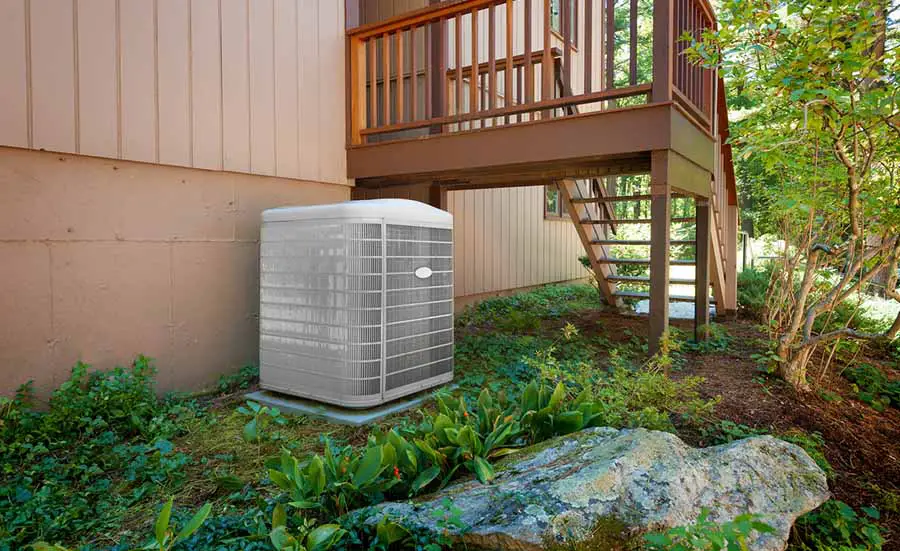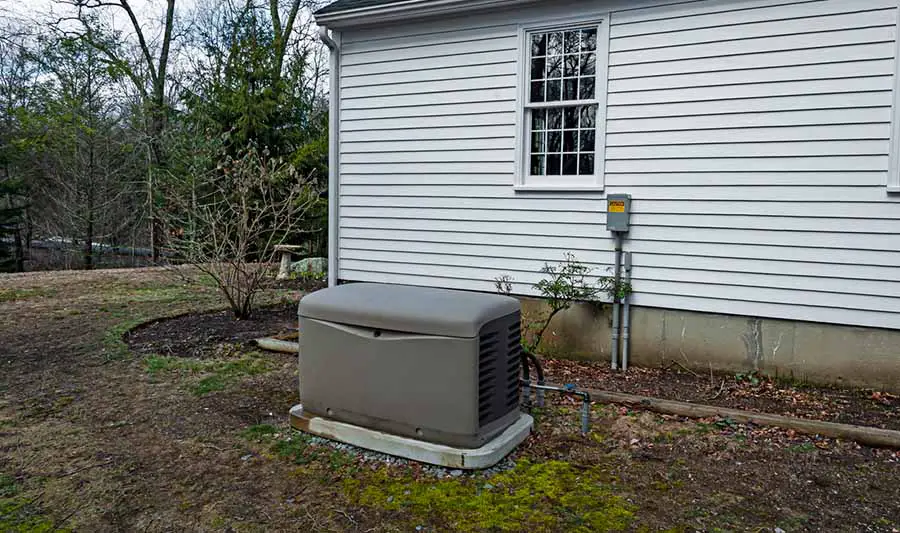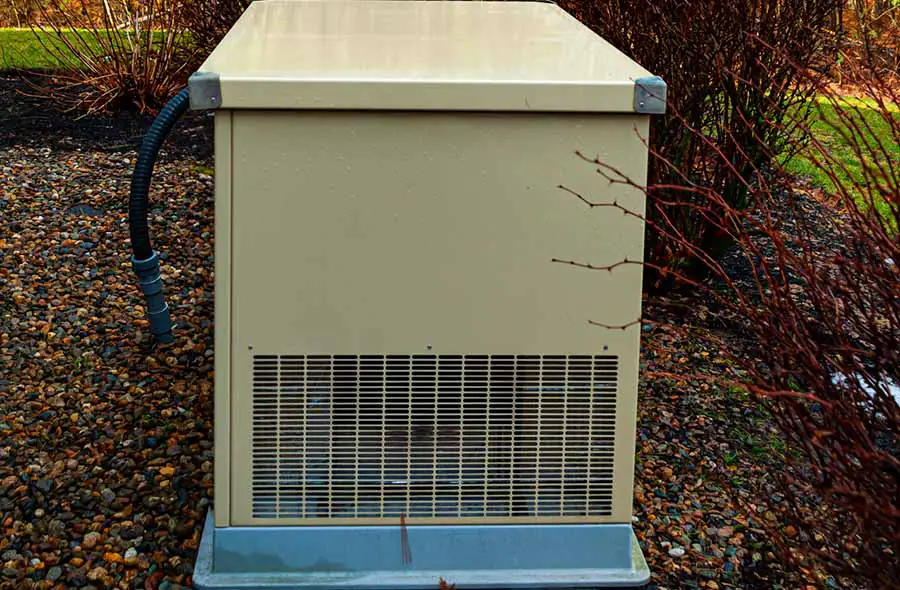
Whole-house generators are an excellent commodity for areas with frequent storms and power outages. Some of the worst storms of the year happen during the summer months when air conditioning is a vital part of surviving the summer heat. This scenario beckons the question of whether or not a whole-house generator is an excellent investment to keep my AC running no matter what.
Whole house generators are great for powering your air conditioner during a power outage. However, air conditioners range from 900-watt window units to 4000-watt whole-house air conditioners, so it’s essential to get a generator that can handle your particular unit’s load.
This article will detail which generators can power each different size of the air conditioner. We’ll also examine how big of a generator you need to fulfill your goals and what all your generator can power at once.
What Size Generator Do You Need to Run an Air Conditioner?
The size of the generator you need to power your air conditioner is entirely dependent upon the size of your air conditioner. If you have a 4-ton air conditioner, then a 14-kilowatt generator is big enough to operate the AC. If your AC is 5-ton, then you’ll need to upgrade to a 17-kilowatt generator.
The way to know for sure what size generator you need to run your air conditioner is to look at the wattage requirements on the air conditioner. The biggest power sucker for air conditioners is on the initial startup. Starting an air conditioner takes as much as three times the amount of wattage it does to run the AC after it’s started up.
So if your air conditioner requires 3,500 watts of power on the initial startup plus 1,000 watts to keep it running, then a 4,000-watt generator is strong enough to power your AC. Using the same mathematics, if your AC takes 5,000 watts to start up and 1,500 watts to continue running. A 6,000-watt generator is an appropriate size for you.
A good cheat sheet to have on hand for the air conditioner to generator sizing comparisons is as follows.
- Find out what tonnage size your air conditioner is.
- Start with the calculation that a 5-ton air conditioner requires a 20,000-watt generator.
- For every tonnage size, you go down, the watt amount of the generator goes down by 3,000. So 4-ton AC = 17,000 watt generator, 3-ton AC = 14,000 watt generator, 2.5-ton AC = 12,500 watt generator, and so on.
- This sizing chart will give you ample wattage to power your air conditioner and several other appliances simultaneously.
How Do You Hook Up an Air Conditioner to a Generator?

Hooking up your air conditioner to your generator is easy or difficult, depending on the type of setup you have. With a portable generator, hooking up a portable or window air conditioner is as easy as plugging the cord end into the generator after you start the generator. Hooking up a mini-split system or a central air conditioning system is significantly more complicated.
Both of these systems are hard-wired into your home’s electrical system and don’t have plugs. Here is a step-by-step process of how to hook your air conditioner up to your generator.
Most of the work will take place inside the house, near or inside the main panel box. You shouldn’t try to make these connections yourself unless you have electrical experience. Working on live wires in the panel box can result in electrical shock leading to death or serious injury.
1. Transfer Switch Installation
The most important part of properly hooking your air conditioner up to your generator is to install a transfer switch. The transfer switch ensures that when the main power goes out, the generator will automatically startup. Everything that’s wired into the transfer switch will also startup when the generator does.
2. Wire the Air Conditioner Into the Panel Box and Transfer Switch
If you want your air conditioner to turn on when your backup generator turns on automatically, you or an electrician must wire it in from the panel box to the transfer switch. This ensures that the air conditioner won’t cease operating when the power kicks off.
3. Make Sure the Transfer Switch is Hooked Up to Your Generator
Next, make sure that you properly wire the transfer switch into your generator and your panel box. If either of these connections is wrong, then your generator won’t start up automatically.
4. Do a Test Run to Make Sure Everything Works
Once everything is ready to roll, do a practice run to ensure you’re ready for your next power outage.
The process mentioned above might sound simple, but it’s complicated and takes anywhere from 3 to 8 hours. You shouldn’t attempt to wire in a transfer switch or an air conditioner unless you have electrical experience. You should instead contact an electrician and let them handle the job for you.
Can a Generac Generator Run an Air Conditioner?
Generac generators are some of the best whole-house generators globally and can most definitely run an air conditioner. If you want a top-of-the-line generator that comes in various sizes, then a Generac generator is the one for you. Generac has whole-house generators ranging from 7,500 watts to 150,000 watts to serve any need you might have.
While a whole-house generator is a better permanent solution for your air conditioner needs, Generac also has a variety of portable generators at your disposal. No matter how large your air conditioner is, Generac will have a generator option capable of running it.
What Other Large Appliances Can a Generac Generator Run?
If you need to power your air conditioner during an outage, the odds are that you’ll want to power a few other things as well. Here is a complete list of appliances, lights, and outlets that you can power alongside your air conditioner with a Generac generator. For the table below, we are figuring out a 2-ton air conditioner.
| Appliance | Wattage Amount | Generator Size Needed |
| Electric stove | 2,000 – 5,000 | 10 kilowatt |
| Electric dryer | 2,000 – 6,000 | 10 – 12 kilowatt |
| Water Heater | 4,000 | 13 – 20 kilowatt |
| Ceiling lights | 20 – 100 | 13 – 20 kilowatt |
| Wall outlets | around 1,500 per outlet | 18 – 22 kilowatt |
| Microwave | 1,200 | 20 – 22 kilowatt |
| TVs | 80 – 400 | 22 – 25 kilowatt |
| Dishwasher | 2,000 | 25 kilowatt |
| Window air conditioner | 2,000 | 25 – 30 kilowatt |
This table is a rough example of determining the size of the generator that you need to power your house. For a more comprehensive list and the idea of generator sizing, it’s best to talk to a generator specialist in your area.
There are many different kinds of air conditioners outside of central AC systems. There are window air conditioners, portable air conditioners, mini-split air conditioning systems, and even RV air conditioners. Just because people are camping doesn’t mean they want to melt! Here’s an additional list of different types of ACs and the number of watts that they use.
Mini-Split Systems (600-800 Watts)
Mini-split air conditioners are a modern and efficient form of air conditioning. You can frequently find this system in garages, shops, large rooms, whole houses, or loft spaces. You can have as many systems as you want in a home, and each one will use around 700 watts of electricity. This relatively low wattage means that you can power up to five or six mini-splits for the same power it would take to control a single central AC.
Window Air Conditioners (500-1,500 Watts)
Window air conditioners aren’t quite as efficient as mini-splits, but they don’t take a ton of wattage to operate either. Tiny and efficient window units can work on as little as 500 watts, while larger ones can require from 1,500 to 2,000 watts on the high end. While this is a decent amount of wattage, it’s still less than a central air conditioner.
Portable Air Conditioners (500-1,000 Watts)
Portable air conditioners are similar to window air conditioners in that you can move them around but differ in that they sit on the ground. This type of air conditioner takes anywhere from 500 to 1,000 watts of power to start and run.
RV Air Conditioners (1,500-3,000 Watts)
RV air conditioners are similar in size to large window air conditioners. Different sized RVs have different air conditioners, and some even have two or three per camper. Each of these air conditioners will use anywhere from 1,500 to 3,000 watts of electricity, so make sure you know the size and amount of air conditioners you’re going to be powering.
Will a 2000-Watt Generator Run an Air Conditioner?

A 2,000-watt generator will run smaller air conditioners like window ACs, mini-split ACs, portable air conditioners, and RV air conditioners. However, the smallest central air conditioner available is 1 ton, and this will require a generator larger than 2,000 watts.
Will a 2000-Watt Generator Run a Refrigerator?
A refrigerator only uses between 100 and 400 watts, and a 2000 watt generator will have no problem running a fridge. The last thing you want is for all the food in your fridge and freezer to spoil, and a 200-watt generator will keep this from happening. A freezer only uses 100 to 300 watts, so your generator shouldn’t have any trouble powering these appliances.
Will a 2000-Watt Generator Run a Well Pump?
There is a wide range of well pump sizes, but the average wattage required to start them is around 3,500 watts. However, some well water pumps only require 1,000 to 2,000 watts, so there’s a decent chance that your 2,000-watt generator can power it. A pump is essential during a power outage if you have a well to keep your house supplied with water to drink and shower.
Will a 2000-Watt Generator Run Lights and Outlets?
A 2000 watt generator will power any lights and most outlets in your home, depending on what you have plugged in. Things like hair dryers and hot irons take a lot of juice, so try not to use these things if you’re attempting to power vital appliances and lights.
Will a 2000-Watt Generator Run a Water Heater?
There’s a chance that a 2000 watt generator could power smaller water heaters, but most water heaters require around 4,000 watts. If this is the case with your water heater, then a 2000 watt generator will not be able to start and operate your water heater.
Will a 2000-Watt Generator Run a Dryer or Stove?
Most electric dryers and stoves require a minimum of 2,000 watts to start up and operate. You can operate one of these appliances at a time, as long as nothing else is running on the generator’s power. Stoves and dryers are great accessories, but if you can get by without them, it would save a lot of strain on your generator.
Final Thoughts
Hopefully, we’ve answered your questions regarding whether or not a generator can power an air conditioner. Make sure that you know the size of your air conditioner and any other appliances or devices that you hope to power, and this will help you determine what size generator you need.
